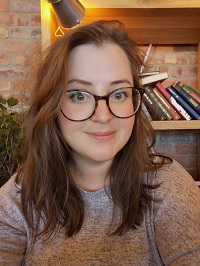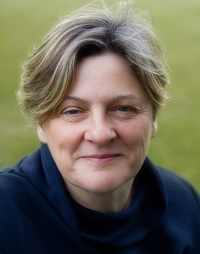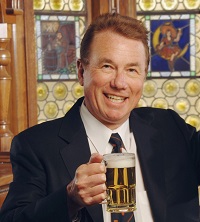Member profiles: Hormones, genetics and brewing beer
Our latest member profiles explore the working lives of neuroendocrinologist Dr Rebecca Dumbell CSci MRSB; director of the MRC Human Genetics Unit at the University of Edinburgh Prof Wendy Bickmore CBE FRSB, and brewer David Ryder MRSB
These profiles appeared in the summer 2021 issue of The Biologist (Vol 68 No 2)
A Day in the Life
Dr Rebecca Dumbell CSci MRSB on life as a neuroendocrinologist in lockdown

My alarm goes off… and at the moment, my commute is usually downstairs to my “home office” set up in my dining room. I started my lectureship at Nottingham Trent University during lockdown 1.0 and a lot of my work has been from home since then. This means I get to wear warm socks and drink coffee from my own machine, accompanied by my co-worker – my dog – who is very good at reminding me to take a break from screen time.
My work involves… working on the neuroendocrine regulation of energy balance, so I am interested in how hormones from throughout the body and the brain talk to each other to influence appetite and burning energy. At the moment a lot of my time is spent applying for funding in order to get my new lab up off the ground. About half of my time is also spent teaching students and this is done largely from home, pre-recording video podcast lectures and coming up with different ways to adapt workshops and practicals that would usually have been run face-to-face before the pandemic.
On another day… I might be teaching in-person on campus. This involves a lot of hand sanitiser, masks, and social distancing, which can be tricky when the students are so spread out and my glasses are steamed up from wearing a mask. I then travel home and work on some data analysis for a paper I am writing and then later on recording and editing a lecture podcast. A lot of communication with colleagues and collaborators is done remotely now and I usually have one or two meetings in a day to discuss some data, future projects, or some upcoming teaching.
I also…am on the board of trustees for the British Society for Neuroendocrinology and I regularly meet other board members to work on upcoming or current projects like webinars and a mentor scheme. This is really fun because it helps me stay connected with people who have similar research interests and it is a good support network.
After work…I take my co-worker for a walk, usually around the local nature reserve where we see all kinds of wildlife and are sometimes treated to a beautiful sunset. I enjoy cooking in my spare time, and I have of course fallen into the lockdown trend of sourdough baking, with my homemade starter ‘Fred Bread’.
The Career Ladder
Prof Wendy Bickmore CBE FRSB on her path to becoming director of the MRC Human Genetics Unit, University of Edinburgh

I first discovered biology at school. I had an inspirational teacher and supportive parents who tolerated me practicing earthworm dissections at home.
I thought I wanted to go on to study medicine but then I read Steven Rose’s ‘The Chemistry of Life’. The idea that you can explain biology through the rules of chemistry inspired me then and still does today.
I studied biochemistry at university, but I hated practicals and never thought that I wanted to do a PhD. However, I was lucky enough to do my final year research project at the MRC Molecular Haematology Unit. I loved the camaraderie and excitement of a research lab. Having the time to make and correct mistakes, to troubleshoot and get an experiment to work convinced me to go on to do a PhD.
A pivotal point in my career was in a journal club during my postdoc. I presented a paper from Julie Korenberg and Mary Rykowski that used fluorescence in situ hybridisation to reveal the distribution of different repeats along human chromosomes – long before there was a genome sequence. The idea that you could study human genome organisation by microscopy, and that chromosome banding patterns reflect an underlying functional compartmentalisation of our genome, were the inspiration for my subsequent career.
The best thing about my job is the joy of being part of making new scientific discoveries. As director of a research unit I also get to think about, and enjoy the success of, everyone else’s science as well and to help direct the future of science.
The worst thing about my job is that I can’t be in the lab anymore. I really enjoyed doing experiments with my own hands. Now I sit behind a computer most of the day – even more so during the COVID pandemic lockdown.
A key piece of advice would be go to seminars and read papers outside of your own area. That is where you will get new ideas and will give you an edge in your own research area.
Any regrets? I do wish I had better bioinformatic skills.
In another life I’d be a gardener or forester – I love being outdoors surrounded by plants and I am quite passionate about reforestation, especially in Scotland.
My Society and Me
World-renowned brewer Dr David Ryder MRSB on how RSB membership helps produce good beer

I joined the Society quite a few years ago (47!) because I felt membership complemented my career goals of becoming, hopefully, a good brewer of beer. After a degree in biological sciences and PhD in biochemistry my journey took me to South Africa, Zimbabwe, Belgium, and finally the United States where I have continued to learn my trade as well as teach others along the way. I have worked at Stella Artois, City Lights and MillerCoors, met an incredible number of people on my journey and, of course, have learnt from the best.
In biology, there is always something new to learn. In brewing, there are many exciting frontiers to further fermentation science, particularly when it comes to innovation in beverages for the future which will, of course, include functional beverage products with many associated exciting possibilities.


